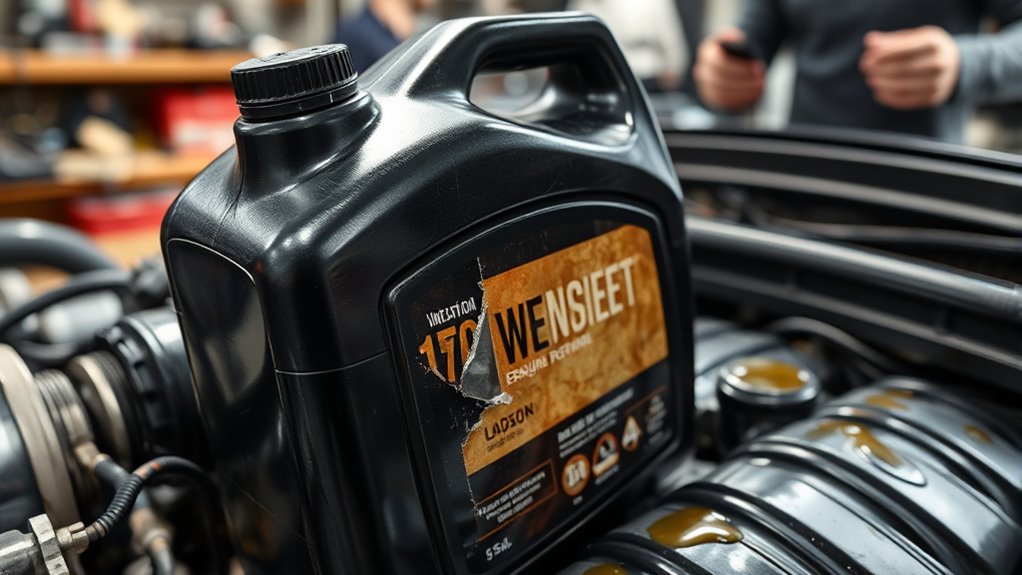Using cheap engine oil might save you a few bucks now, but it can lead to costly engine damage later. Low-quality oils break down faster, lose their protective properties, and lack essential additives, causing increased wear, sludge buildup, and possible engine failure. These hidden costs far outweigh the initial savings, as repairs and replacements can drain your wallet. Keep going to uncover how investing in good oil can protect your engine and your wallet in the long run.
Key Takeaways
- Cheap oils degrade quickly, leading to increased engine wear and costly repairs over time.
- Inferior oils lack essential additives, causing sludge buildup and engine component clogging.
- Using low-quality oil heightens the risk of engine damage, resulting in expensive rebuilds or replacements.
- Poor lubrication from cheap oils accelerates friction, friction, and shortens engine lifespan.
- Initial savings from cheap oil are overshadowed by higher maintenance and repair costs later.

While cheap engine oil might save you money upfront, it often comes with hidden costs that can damage your vehicle in the long run. One of the biggest risks is the potential for costly engine repairs down the line. Low-quality oils tend to break down faster, losing their lubricating and protective properties. This deterioration isn’t always obvious at first glance, but it can lead to increased engine wear, overheating, and eventually, severe damage that requires expensive repairs. When you choose cheaper oil, you might be ignoring the underlying oil degradation factors that influence how well the oil performs over time. These factors include improper additive balance, poor film strength, and inadequate viscosity stability, all of which are more common in low-grade oils. As a result, your engine is less protected against friction, corrosion, and sludge buildup. This means your engine components are more vulnerable to wear, which accelerates the need for repairs and replacements.
Furthermore, the importance of using high-quality oil is supported by the fact that engine protection plays a crucial role in maintaining vehicle longevity and performance. You might think you’re saving money by opting for cheap oil, but what you’re actually doing is risking the integrity of your engine. Cheap oils often lack the necessary additives that help prevent sludge and varnish formation, leading to deposits that clog essential engine parts. Over time, these deposits can cause parts to stick, seize, or fail prematurely. The degradation of oil quality also means it can’t properly handle extreme operating conditions, such as high temperatures or frequent short trips, further increasing the likelihood of damage. When oil fails to lubricate properly, friction between moving parts intensifies, causing more rapid wear and tear. This deterioration accelerates the cycle of needing repairs, which can quickly surpass the initial savings you thought you made.
Ignoring the importance of quality oil isn’t just about immediate expenses—it’s about protecting your engine’s longevity. The costs associated with replacing damaged engine parts, fixing oil-related issues, or even rebuilding the engine can far outweigh the initial savings from buying cheaper oil. So, while it might seem tempting to cut corners with lower-priced options, you’re better served investing in reputable, high-quality engine oil. It ensures your engine maintains ideal performance, reduces the risk of costly repairs, and ultimately saves you money over the vehicle’s lifespan. Remember, the true cost of cheap oil isn’t just in the price tag—it’s in the potential damage it can cause to your engine’s health and your wallet.
Frequently Asked Questions
How Does Cheap Engine Oil Affect Overall Vehicle Lifespan?
Cheap engine oil can shorten your vehicle’s lifespan because it tends to break down faster, leading to oil breakdown and reduced lubrication. Over time, additive depletion diminishes the oil’s ability to protect engine parts, increasing wear and tear. This means you might face costly repairs sooner than expected. Sticking with quality oil helps maintain engine health, ensuring your vehicle runs smoothly and lasts longer.
Can Cheap Oil Void My Car’S Warranty?
Think of cheap oil as a shaky foundation for your car’s engine. Using low-quality oil with poor additive quality or improper oil viscosity can void your warranty because manufacturers often require high-standard lubricants. If you skimp on oil, you risk damage that’s considered neglect, which warranty providers may refuse to cover. Always check your vehicle’s manual to confirm your oil meets the right viscosity and additive standards to keep your warranty intact.
Are There Brands That Offer Affordable yet Quality Engine Oils?
You’re wondering if there are brands that offer affordable yet quality engine oils. You should look for brands with a strong reputation for reliability and consistent performance. Focus on ingredient quality, ensuring the oil meets industry standards like API or ILSAC certifications. Some popular brands balance cost and quality, so researching reviews and specifications helps you find options that protect your engine without overspending.
How Often Should I Change Cheap Engine Oil?
You should change cheap engine oil every 3,000 to 5,000 miles, or as recommended by your vehicle’s manufacturer. Cheap oils are more prone to oil contamination and viscosity breakdown, which can cause engine wear. Regularly changing your oil helps prevent sludge buildup and maintains proper lubrication, ensuring your engine runs smoothly. Don’t ignore signs like increased engine noise or poor performance, as they indicate it’s time for an oil change.
What Signs Indicate Cheap Oil Is Harming My Engine?
You’ll notice signs that cheap oil is harming your engine, like increased engine noise and poor performance. Oil degradation causes the oil to lose its lubricating properties, leading to metal-on-metal contact. If your engine sounds louder or runs rough, it’s a clear sign the oil isn’t doing its job. Regular checks and early replacement can prevent costly damage, ensuring your engine stays smooth and protected.
Conclusion
So, next time you’re tempted by that rock-bottom price, remember: cheap engine oil can turn into a real troublemaker, draining your wallet faster than a leaky bucket. Don’t let your ride suffer like a Knight in shining armor facing a dragon—invest in quality. After all, even in the age of chivalry, you’d think folks knew better than to skimp on their steed’s health. Better safe than stuck in a jam, right?










